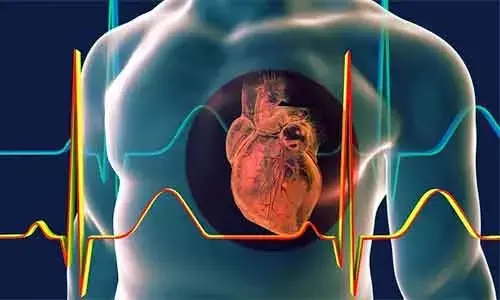- Home
- Medical news & Guidelines
- Anesthesiology
- Cardiology and CTVS
- Critical Care
- Dentistry
- Dermatology
- Diabetes and Endocrinology
- ENT
- Gastroenterology
- Medicine
- Nephrology
- Neurology
- Obstretics-Gynaecology
- Oncology
- Ophthalmology
- Orthopaedics
- Pediatrics-Neonatology
- Psychiatry
- Pulmonology
- Radiology
- Surgery
- Urology
- Laboratory Medicine
- Diet
- Nursing
- Paramedical
- Physiotherapy
- Health news
- Fact Check
- Bone Health Fact Check
- Brain Health Fact Check
- Cancer Related Fact Check
- Child Care Fact Check
- Dental and oral health fact check
- Diabetes and metabolic health fact check
- Diet and Nutrition Fact Check
- Eye and ENT Care Fact Check
- Fitness fact check
- Gut health fact check
- Heart health fact check
- Kidney health fact check
- Medical education fact check
- Men's health fact check
- Respiratory fact check
- Skin and hair care fact check
- Vaccine and Immunization fact check
- Women's health fact check
- AYUSH
- State News
- Andaman and Nicobar Islands
- Andhra Pradesh
- Arunachal Pradesh
- Assam
- Bihar
- Chandigarh
- Chattisgarh
- Dadra and Nagar Haveli
- Daman and Diu
- Delhi
- Goa
- Gujarat
- Haryana
- Himachal Pradesh
- Jammu & Kashmir
- Jharkhand
- Karnataka
- Kerala
- Ladakh
- Lakshadweep
- Madhya Pradesh
- Maharashtra
- Manipur
- Meghalaya
- Mizoram
- Nagaland
- Odisha
- Puducherry
- Punjab
- Rajasthan
- Sikkim
- Tamil Nadu
- Telangana
- Tripura
- Uttar Pradesh
- Uttrakhand
- West Bengal
- Medical Education
- Industry
Broken heart syndrome cases rise during COVID-19 outbreak, find researchers

Cleveland Clinic researchers have found a significant increase in patients experiencing stress cardiomyopathy, also known as broken heart syndrome, during the COVID-19 pandemic.
Stress cardiomyopathy occurs in response to physical or emotional distress and causes dysfunction or failure in the heart muscle. Patients typically experience symptoms similar to a heart attack, such as chest pain and shortness of breath, but usually do not have acutely blocked coronary arteries. The left ventricle of the heart, however, may show enlargement. Other symptoms include irregular heartbeat, fainting, low blood pressure and cardiogenic shock (an inability of the heart to pump enough blood to meet the body's demands due to the impact of stress hormones on the cells of the heart).
"The COVID-19 pandemic has brought about multiple levels of stress in people's lives across the country and world. People are not only worried about themselves or their families becoming ill, they are dealing with economic and emotional issues, societal problems and potential loneliness and isolation," said Ankur Kalra, M.D., a Cleveland Clinic cardiologist in the Sections of Invasive and Interventional Cardiology and Regional Cardiovascular Medicine, who led the study. "The stress can have physical effects on our bodies and our hearts, as evidenced by the increasing diagnoses of stress cardiomyopathy we are experiencing."
The causes of stress cardiomyopathy, also known as Takotsubo cardiomyopathy, are not fully understood. However, physicians believe that a person's reaction to physically or emotionally stressful events causes a release of stress hormones that temporarily reduce the heart's ability to pump -- causing it to contract less efficiently or irregularly instead of in a steady, normal pattern.
For the study, cardiologists looked at 258 patients coming into Cleveland Clinic and Cleveland Clinic Akron General with heart symptoms known as acute coronary syndrome (ACS) between March 1 and April 30th and compared them with four control groups of ACS patients prior to the pandemic. They found a significant increase in patients diagnosed with stress cardiomyopathy, reaching 7.8% compared with pre-pandemic incidence of 1.7%. Patients with stress cardiomyopathy during the COVID-19 pandemic had a longer length of hospital stay compared with those hospitalized in the pre-pandemic period; however, there was no significant difference in mortality between the groups. All of the patients diagnosed with stress cardiomyopathy tested negative for COVID-19.
The study was published today in JAMA Network Open.
"While the pandemic continues to evolve, self-care during this difficult time is critical to our heart health, and our overall health," said Grant Reed, M.D., M.Sc., director of Cleveland Clinic's STEMI (ST-elevation myocardial infarction) program and senior author for the study. "For those who feel overwhelmed by stress, it's important to reach out to your healthcare provider. Exercise, meditation and connecting with family and friends, while maintaining physical distance and safety measures, can also help relieve anxiety."
Patients with stress cardiomyopathy generally recover their heart function and recover in a matter of days or weeks, although the condition can occasionally cause major adverse cardiac and cerebrovascular events and rarely can be fatal. Stress cardiomyopathy is typically treated with heart medications to lower blood pressure and slow the heart rate. Other medications may be prescribed to help manage stress.
Researchers say more studies are warranted in this area, particularly to see if this trend is present in other regions of the country.
Hina Zahid Joined Medical Dialogue in 2017 with a passion to work as a Reporter. She coordinates with various national and international journals and association and covers all the stories related to Medical guidelines, Medical Journals, rare medical surgeries as well as all the updates in the medical field. Email: editorial@medicaldialogues.in. Contact no. 011-43720751
Dr Kamal Kant Kohli-MBBS, DTCD- a chest specialist with more than 30 years of practice and a flair for writing clinical articles, Dr Kamal Kant Kohli joined Medical Dialogues as a Chief Editor of Medical News. Besides writing articles, as an editor, he proofreads and verifies all the medical content published on Medical Dialogues including those coming from journals, studies,medical conferences,guidelines etc. Email: drkohli@medicaldialogues.in. Contact no. 011-43720751


